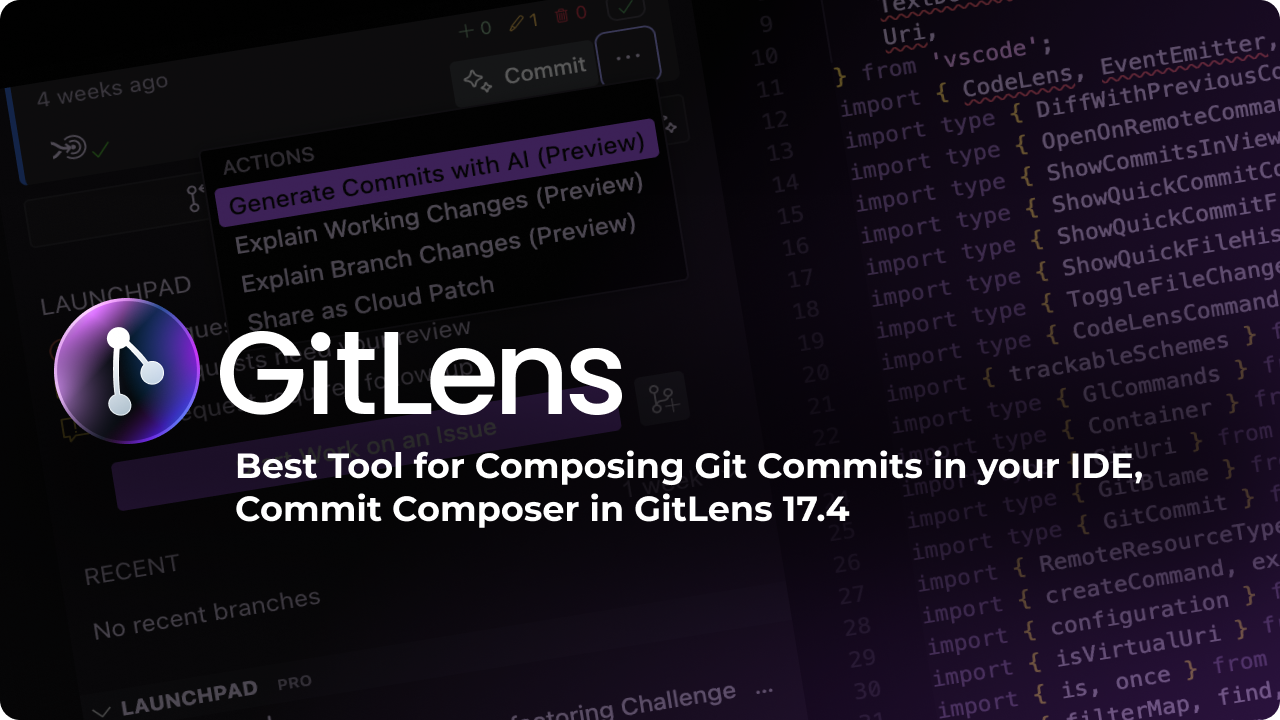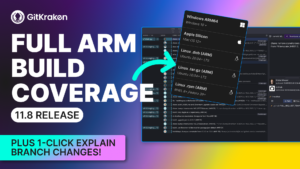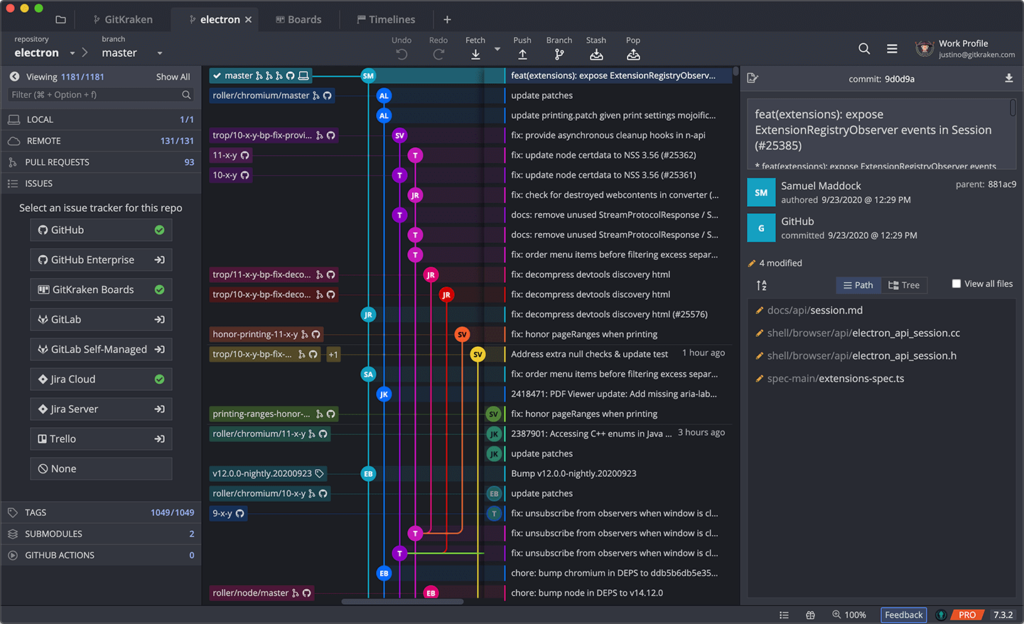In GitLens 17.2 we introduced Commit Composer as an early preview of a set of AI-powered tools to help you craft cleaner, more meaningful commits. With GitLens 17.4, Commit Composer has leveled up. Based on your feedback, it’s now a fully interactive drafting experience that lets you compose commits in a single click, and puts you in control of your commit history.
From Automation to Drafting Playground
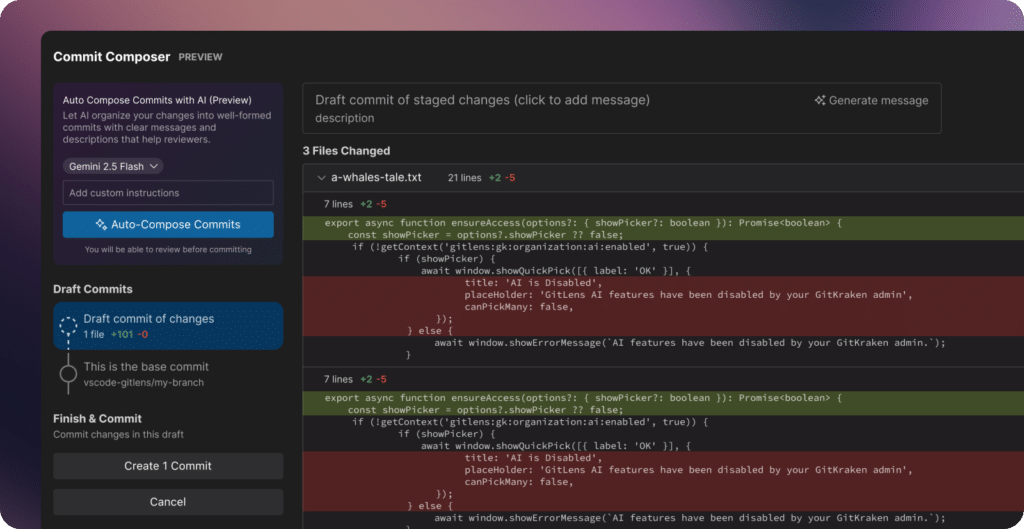
The first version of Commit Composer gave you a quick way to generate commits from your working changes or recompose existing commits with AI. It helped organize messy change sets into logical commits, but it was mostly one-and-done.
In GitLens 17.4, Commit Composer has evolved into a draft-first interface where you can:
- Preview commits before they’re applied – review AI’s output safely without touching your repo
- Switch between AI models to fit your style and workflow
- Guide AI with custom instructions (e.g., “follow conventional commits,” “keep subject lines under 50 chars”)
- Edit, regenerate, or rewrite commit messages directly in the UI
- Inspect diffs for every proposed commit before committing
You get the speed of AI with the precision of human review.
More Control, Less Risk
The new Commit Composer view represents a fundamental shift in approach:
Before: Send changes to AI → Get back well-formed commits → Done
Now: Interactive composition → Preview and modify → Apply when ready
This new approach gives you the best of both worlds: AI assistance when you want it, complete manual control when you need it.
Commit Composer in 17.4 is designed for trust and flexibility:
- You can commit directly from the Composer view or back out at any time
- Undo and reset options are built-in, so experimentation is safe
- Want more control? You can write messages manually in the Composer view and still take advantage of the structured workflow
Key Features of the New Commit Composer View
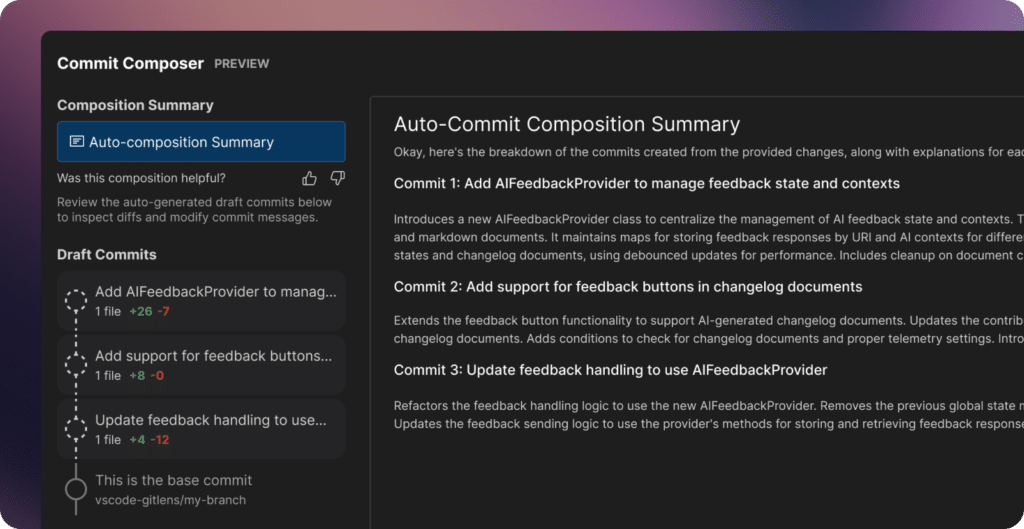
Before AI Composition
- Add detailed instructions: Tell the AI exactly how you want your commits organized
- Set composition preferences: Define your preferred commit style and granularity
After AI Composition
- Preview generated commits: See exactly what the AI has planned before applying any changes
- Edit commit messages: Refine titles and descriptions to match your standards
- Review diffs: Examine the exact changes included in each proposed commit
Manual Control
- Work without AI: Use the view for manual commit composition and organization
How to Access Commit Composer
The Commit Composer view is easily accessible from multiple entry points throughout GitLens:

- Active branch card: In the GitLens Home View
- Commit Details view: Look for the “Compose Commit” action
- ✨ icon in the SCM view header

- WIP context menu: on the WIP row in the GitLens Commit Graph
- GitLens commands: Use the Command Palette to search for “Commit Composer”
- Pro tip: You don’t need AI features connected to use the view. It works great for manual commit composition too. AI features (auto-composition and message generation) are available when you have a connected AI provider.
Real-World Benefits
For Individual Developers
- Faster commit organization: Spend less time on Git mechanics, more time on code
- Better commit messages: Let AI help craft clear, consistent messages
- Reduced cognitive load: Visual interface eliminates the need to remember complex Git commands
- Safety first: Preview everything before applying changes
For Teams
- Improved code reviews: Clean, logical commit progression makes reviews more effective
- Better debugging: Clear commit history makes tracking down issues easier
- Knowledge transfer: Well-organized commits tell the story of development decisions
What’s Coming Next
This new foundation enables exciting features we’re planning for future releases:
- Drag-and-drop functionality for moving lines and hunks between draft commits
- Create new draft commits on the fly during the composition process
- Reorder commit sequences
- Recompose existing branches and commits with the same controls
From Preview to Enhanced Experience
While Commit Composer is still marked as “PREVIEW” as we continue iterating based on community feedback, the core functionality is solid and ready for everyday use. This designation reflects our commitment to continuous improvement based on how you use the feature in practice.
Bottom Line
Commit Composer won’t solve all your Git problems, but it will solve the most annoying one: spending time on commit choreography instead of writing code.
If you’re tired of choosing between messy commits and flow-state interruption, Commit Composer is worth your time. Try it. Break it. Tell us what’s wrong with it.
Getting Started Today
Here’s how to get started:
- Update to GitLens 17.4
- Access the Commit Composer view from any of the entry points mentioned above
- Start with your working directory changes and explore the interface
- Try the AI composition if you have an AI provider connected
- Share your feedback on our GitHub Discussion to help us make it even better
The Future of Git Workflows
Commit Composer represents more than just a feature, it’s a new way developers can work with Git. By combining the power of AI with intuitive visual interfaces, we’re removing the friction between your creative development process and clean, professional commit history.
Your development workflow shouldn’t be constrained by Git’s complexity. With Commit Composer, you can focus on writing great code while AI and intelligent tooling handle the details.
We Want to Hear From You
As we continue to refine Commit Composer, your experience is invaluable. We’re particularly interested in:
- How the new interactive flow fits into your daily workflow
- Which AI composition features you find most useful
- What additional customization options would be helpful
- How we can make the experience even more intuitive
Try the new Commit Composer view today and let us know what you think.
Ready to transform your commit workflow? The new Commit Composer view is waiting for you in GitLens 17.4.
Want to see what else was released in GitLens 17.4?
View the latest release notes here
 GitKraken MCP
GitKraken MCP GitKraken Insights
GitKraken Insights Dev Team Automations
Dev Team Automations AI & Security Controls
AI & Security Controls